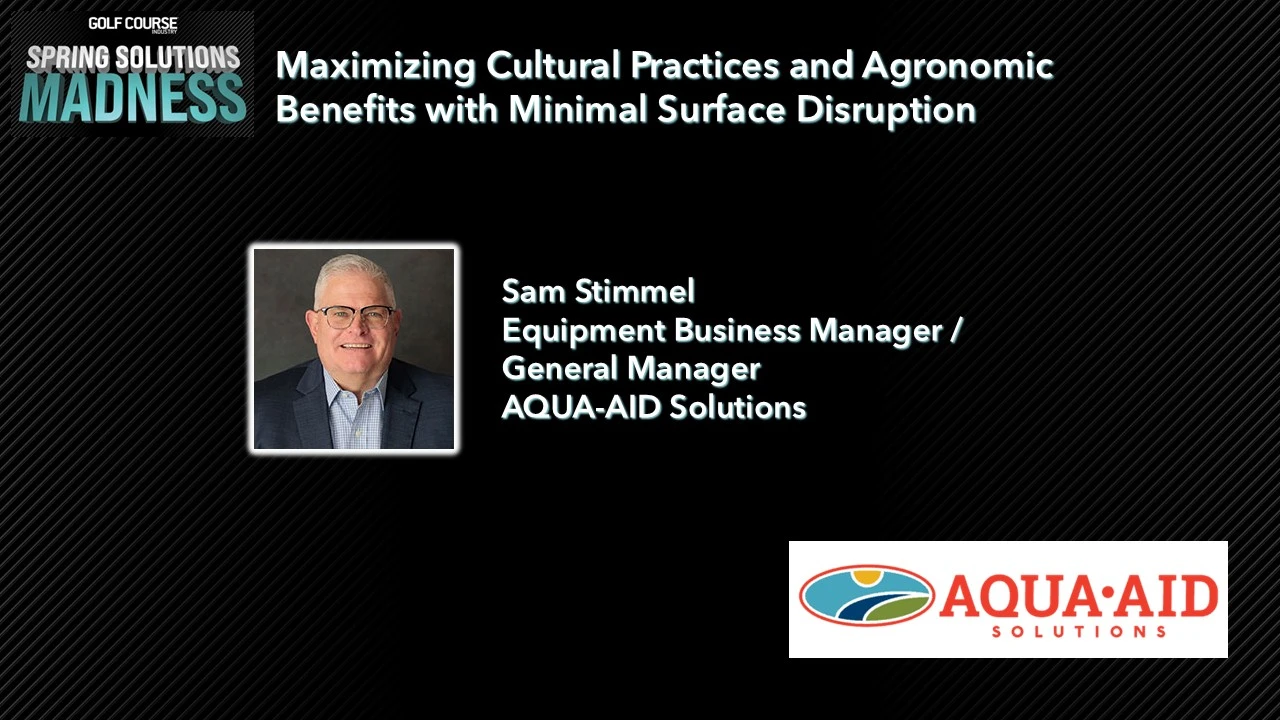
This massive industry serving this mostly happy game features myriad job titles and descriptions.
Consider the possible titles within one agronomy department. Director, superintendent, assistant superintendent, equipment technician, irrigation technician, spray technician, assistant-in-training, horticulturist, crew lead, equipment operator, intern, seasonal employee. Yes, we know we’re probably missing a few. And we know that’s just one department at many facilities.
Gautam Patankar possesses a job title not imbedded on many business cards. Patankar holds the position of vice president of culture and coaching for Bobby Jones Links. VP of culture and coaching? It’s the question Patankar fields often.
“By and large,” Patankar says, “we have a lot of people in our company who are introverts, and we have to teach them how to be extroverts.”
Bobby Jones Links is in a position similar to nearly every company in the golf business. Getting the most from people — and creating an atmosphere where they interact well with strangers — shapes the customer experience.
Formerly known as Mosaic, Bobby Jones Links is a Georgia-based management company overseeing operations at public, private, resort and community golf facilities. A collegiate golfer at Rutgers University who grew up caddying in New Jersey, Patankar joined the company in 2006. He was the general manager at a pair of Georgia clubs before shifting into a vice president of operations role in 2014. Understanding the need to elevate the customer experience, the company moved Patankar into his current position at the start of 2021.
“We said, ‘What’s our biggest gap and how can we differentiate ourselves from other management companies, whether big or small?’” Patankar says. “We all landed on the fact that one thing the industry says it does really well, but it really struggles with, is customer service.”
Patankar visits clubs within the Bobby Jones Links portfolio — the company’s highest-profile property is the renovated and rejuvenated Bobby Jones Golf Course in Atlanta — and works with department heads, including directors of agronomy and superintendents, on leadership skills. The overarching goal, though, is to connect with frontline workers, whom Patankar says represent 90 percent of the company’s workforce. “By sheer volume, they are the ones that make this company go, so we tell them how important they are, and we teach them how important they are,” he adds. The training program has evolved to the point where frontline workers are now leading Zoom calls or in-person sessions.
Like any company relying on hourly workers, Bobby Jones Links has experienced challenges hiring and retaining quality employees. Patankar emphasizes in his interactions with department heads that companies and facilities with an empowering and caring culture have the best chance of succeeding in the labor market.
“People want to be part of something where they are really valued and that’s why it’s important that we follow through on what we talk about,” he says. “There’s more to it than giving somebody $3 (more) an hour and thinking this person is going to be great and they’re going to stay forever. I understand money means a lot, but I still think it comes down to recognition and being valued. We have a work family and people want to be included in the work family.”
Providing opportunities for career advancement is a proven way a department can show employees they are valued. On the turf side, that means explaining to employees they can make the leap from an hourly or seasonal employee into a full-time position such as an assistant superintendent or technician. The golf industry lags behind other industries in this area, Patankar says.
“Our industry has to start giving people a legitimate trajectory or a legitimate path to keeping them in the business or otherwise we are going to continue to lose really great leaders to industries that allow them to see a path that they don’t have in our industry,” he adds. “All these other companies do that … they put you through school if you need to, they educate you if you need to, they take time with different programs for your personal growth.
“The golf industry has been a little bit archaic in that regard. Some do it better than others. It usually takes the cart attendant or server to do something awesome where they turn around and say, ‘I have to do it with that person.’ I can’t afford to lose them. This isn’t about affording to lose them, it’s about cultivating talent and giving them a reason to stay because they can be a future leader.”
Investing in culture and coaching takes times, a scant resource for department heads and employees who are already overexerted because of labor shortages. The upfront time, in Patankar’s view, is worth the investment, especially considering the alternative. “If your employees are happier and they come to work more, you don’t have that churn of trying to rehire,” he says.
Happy employees. Happy customers.
“In the last year, golf membership sales are skyrocketing,” Patankar says. “If you go to the club and talk to the members and ask how it’s going, they say, ‘I have never seen a chef come out now as much as in the past. I was out on the course the other day and hit one into the woods, and the guy on the mower got off the mower and gave me three golf balls.’ You start hearing and seeing those stories, and it starts penetrating through the team.”

Tartan Talks No. 62

Harrison Minchew has an opportunity few of his peers receive these days: He’s overseeing construction of a new golf course.
Minchew joined the Tartan Talks podcast to discuss his collaboration with former PGA Tour player Fred Funk at RainDance National, a 300-acre Colorado site between Denver and Fort Collins. The scenery and terrain are an architect’s dream. “The site is extraordinary,” says Minchew, who started his career with Arnold Palmer Design in 1982. “I have never had a site this nice. I just come out here and say, ‘Wow, am I really doing this?’”
RainDance National has occupied the bulk of Minchew’s work thoughts since construction commenced last September. In addition to being the lead architect, he’s serving as project manager. The Florida-based architect has been living in Colorado throughout construction.
“It’s a little stressful being away from Ponte Vedra Beach for this long,” he says. “But you only get one opportunity in life to do something this special, and this is it.”
To learn more about RainDance National and Minchew’s career, download the podcast on the Superintendent Radio Page of Apple Podcasts, Spotify and other popular distribution platforms.

Turfheads Take VI: Yes, you have a great story to tell
Submissions for the annual December issue are due Friday, Nov. 5, 2021.
Everybody has a story to tell.
Even you.
Why not share your story — of accomplishment or struggle, of friends acquired or lost, of lessons learned, of your year in review — in the sixth annual Turfheads Take Over issue, which will be published in December?
Feel free to write about any industry topic you feel is relevant. Topics covered in 2020 included the importance of mentors, how to (subtly) tout your value to the club, how assistants (or anybody, really) can better serve themselves and their club, what makes local golf courses special, thinking about the course as a story, returning to the industry, and the end of the line.
Everybody with an interest in the golf industry and helping others is encouraged to write. Past contributors have included current and former superintendents, assistant superintendents, designers and architects, teachers and researchers, consultants, and manufacturer and distributor representatives.
Stories of 600 words or more with accompanying photos or other images can be emailed to Guy Cipriano (gcipriano@gie.net) or Matt LaWell (mlawell@gie.net). And if you need any help throughout the writing and editing process, just call or send an email. We’re here and happy to help you however we can.

COURSE NEWS
The Summit Club at Armonk in Armonk, New York, celebrated the official grand opening of its Rees Jones-renovated golf course. Improvements include three new holes on the back nine, the rebuilding of all fairway and greenside bunkers, and the adjustment of some bunker locations. Several greens complexes were added to provide new greenside chipping areas, and multiple landing zones were created on a few holes to improve their playability. The range and practice facilities also were upgraded and a new short game area was added.
TPC Deere Run, host of the PGA Tour’s John Deere Classic, is undergoing a major bunker renovation. Led by PGA Tour Design Services, with input from course architect and former PGA Tour professional D.A. Weibring, the renovation is expected to last 132 days (weather pending). Each bunker will have the entirety of the sand, surrounding grass, existing liners and drainage removed before being updated with an all-new drainage system and sand. Upon completion, the bunkers will then be sodded with Turf Type Tall Fescue sod. The course will remain open for play during the project.
Duininck Golf announced it has completed second phase tee renovations at Paako Ridge Golf Club in Sandia Park, New Mexico. Paako Ridge sits just a few miles east of Albuquerque, in the shadows of the Sandia Mountains. The project focused on modifying and modernizing the tee complexes, plus enhancements to the irrigation system and surrounding native areas.
Richardson | Dannerhas broken ground on bunker work at Anchorage Golf Course, which will play host to the 2022 U.S. Senior Women’s Amateur. The work follows several years of master planning and greens work at the 30-year-old public facility, originally designed by Bill Newcomb for the Municipality of Anchorage.
Arcis Golf acquired six Mickelson Golf Properties in Arizona from Phil Mickelson and his business partner, Steve Loy. The clubs in the sale include The Stone Canyon Club, The Golf Club at Chaparral Pines, Rim Golf Club, McDowell Mountain Golf Club, Ocotillo Golf Club and Palm Valley Golf Club. Arcis Golf now has 15 properties in and around Phoenix, and 66 total clubs across the country.
Industry buzz
The PGA Tour will make two major donations to the GCSAA through the GCSAA Foundation. The PGA Tour will contribute $250,000 over five years to help implement BMPs on the golf facility level and to support the First Green. The PGA Tour has also pledged $50,000 over the next 10 years for the Allan MacCurrach Jr. Award, which is a scholarship with the purpose of recognizing an outstanding non-traditional student seeking a career in golf course and turfgrass management.
Jeff Steen is the new director of agronomy at Big Cedar Lodge, where he will oversee the resort’s five golf courses. Steen has more than 24 years of experience managing premier golf resorts, including 13 years with the Pebble Beach Company.
Quali-Pro announced Suprado insecticide has received EPA registration. The new product features the insect growth regulator Novaluron, which provides ABW control.

Putting championships in Pennsylvania
The USGA has awarded five more U.S. Open Championships and four U.S. Women’s Open Championships to a pair of storied Pennsylvania venues: Oakmont Country Club and Merion Golf Club.
The USGA also committed to bring its national championships to the Keystone State with greater frequency, even beyond the now 18 championships scheduled to be played in the commonwealth through 2050. This year’s U.S. Amateur at Oakmont marked the 88th USGA championship conducted in Pennsylvania, the most of any state and the latest in a relationship between the state and the USGA that began with the 1899 U.S. Women’s Amateur at Philadelphia Country Club and continued with the 1904 U.S. Women’s Amateur at Merion and the 1919 U.S. Amateur at Oakmont.
Oakmont, which was previously announced as the host site for the 2025 U.S. Open, will host the 2028 and 2038 U.S. Women’s Opens, the 2034, 2042 and 2049 U.S. Opens, the 2033 Walker Cup Match and the 2046 U.S. Women’s Amateur. It will become the second U.S. Open anchor site named by the USGA, in an effort to return to storied venues with deep and meaningful USGA championship history every five to six years. Pinehurst Resort & Country Club was designated an anchor site last year.
Merion, which was previously named the host site for the 2022 Curtis Cup Match and the 2026 U.S. Amateur, will host four additional Opens — the 2030 and 2050 U.S. Open and the 2034 and 2046 U.S. Women’s Open, with additional championships to be named in the future. Merion, a key long-term strategic partner of the USGA, has hosted 18 USGA championships — the most of any site.
Pennsylvania boasts 671 golf courses and a thriving $2.3 billion golf economy that employs more than 50,000 people statewide, according to the National Golf Foundation.

Explore the September 2021 Issue
Check out more from this issue and find your next story to read.
Latest from Golf Course Industry
- Tartan Talks 105: Nathan Crace and Todd Quitno
- Disease Discussion 24: Let the turf talk to you
- From the publisher’s pen: Foggy intrigue
- USGA releases Water Conservation Playbook
- Vilamoura Golf courses awarded GEO Certified status
- GCSAA’s Health in Action 5K/2K reaches fundraising goal
- Landscapes Golf Management to participate in data analyzation initiative
- Reel Turf Techs: Carl Michael





